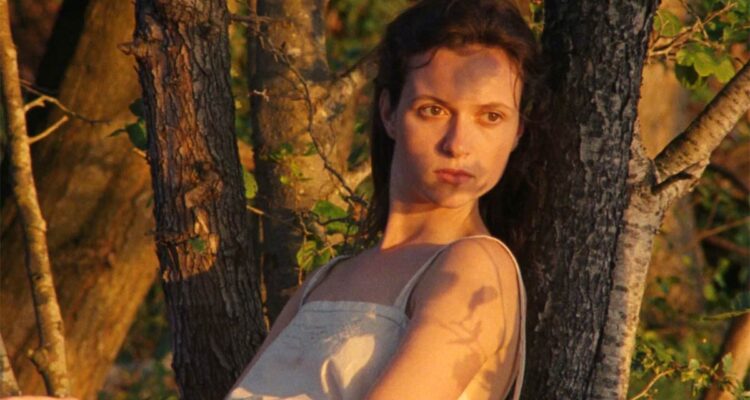Two years in France inspired Italian director Pietro Marcello to create “Scarlet,” his French-language feature debut and the opening film of this year’s Directors’ Fortnight at the Cannes Film Festival. Freely inspired by Aleksandr Grin’s tale “The Scarlet Sails,” the film examines the quiet tenderness that permeates the relationship between a father comfortable in skepticism and a daughter driven by unshakeable belief.
READ MORE: Cannes 2022 Preview: 25 Must-See Films To Watch
“You can do so-called miracles with your own hands”, reads the epigraph of Marcello’s lyrical period drama, and the heavily calloused hands of carpenter Raphaël (Raphaël Thiéry) carry the weight of creating such wonders. Guided by the dexterous touch of an artist, the wood undergoes a miracle-like metamorphosis, shaped into intrinsic toys, trinkets and sculptures. The same swollen fingers travel seamlessly through the accordion, filling rooms and fields with music.
Raphaël’s hands, however, wander aimlessly once the hands of his wife are no longer there to be held. Mary, his beloved, died while the carpenter was fighting in World War I, leaving behind an infant daughter whose existence is just as overwhelming to Raphaël as the news of his recent bereavement. As a widower and a father with few job prospects in a society struggling to overcome the ripples of war, the woodworker accepts lodging from Adeline (Noémie Lvovsky), the stern landowner who lovingly cared for his daughter during his absence.
The casting of Thiéry is the most inspired choice in “Scarlet.” During the film’s first act, Marcello and cinematographer Marco Graziaplena closely follow Raphaël as the man attempts to navigate a life drained of all sense of familiarity. Thiéry, whose rugged appearance fits the role of the gentle giant like a glove, wrestles with the notion of fatherhood, initially clumsily in his love for Juliette (Juliette Jouan), the small girl whose eyes so greatly resemble those of the woman he is doomed to never see again. In his expressive face lies the tiresome burden of grief and the joyful marks of loving stupefaction, the lines of his countenance softened by a growing affection for his daughter while also hardened by years of relentless struggles.
Once the film veers away from its compelling leading man, it never quite reaches the same level of enthrallment. Shunned by the locals for reasons Marcello doesn’t bother to dwell upon, Raphaël becomes reclusive, with Juliette’s development sweeping the protagonism away from her father. It is from here onwards that “Scarlet” leans into its folk fairytale elements, introducing a witch who tells the young woman she is destined to be whisked away from provincial Normandy by a ship flying scarlet sails.
As Juliette spends her days singing either by the river near the farm or by the old piano her father fondly renovated for her musical education, the prophecy is never far from her thoughts. The spaces around the young woman are colored by a soft pastel palette of greens and creams and browns, readying the viewer for the fateful arrival of the scarlet hue. Slowly, red does slowly creep into the frame – be it in the singer’s rosied cheeks as she giggles with Adeline by the kitchen table or on the delicate wooden toys she travels into town to sell.
“Scarlet”, too, is the letter on Raphaël’s chest, one so powerful it prevents Juliette from ever truly belonging. The girl is berated by the local children as an infant and mocked by the townspeople as an adult, never offered the chance to exist free from the stigma attached to her family. This detachment is employed by Marcello to emphasize the mysticism around Juliette, her lonely voice echoing by the water as of a siren, eventually luring in a young pilot (Louis Garrel), who becomes spellbound by this woman who embodies the archetype of the forbidden fruit. The brief relationship between the two is like a horn on the head of a rabbit – somewhat amusing yet misplaced, and it acts as a final nail in the coffin that is the film’s narrative progression.
The arresting visual competency of “Scarlet,” which includes the clever use of archival footage previously seen in Marcello’s Venice darling “Martin Eden” and the beautifully composed textures of its cinematography, can’t salvage its muddled pace. As the Italian director lingers on the idea of the mighty hands of fate, one can’t help but wish he had instead lingered on the battered hands of the puzzling carpenter, this ambitious yet lukewarm exercise in magical realism amounting to a drearily frustrating watch. [C]
Follow along with all our coverage from the 2022 Cannes Film Festival.

